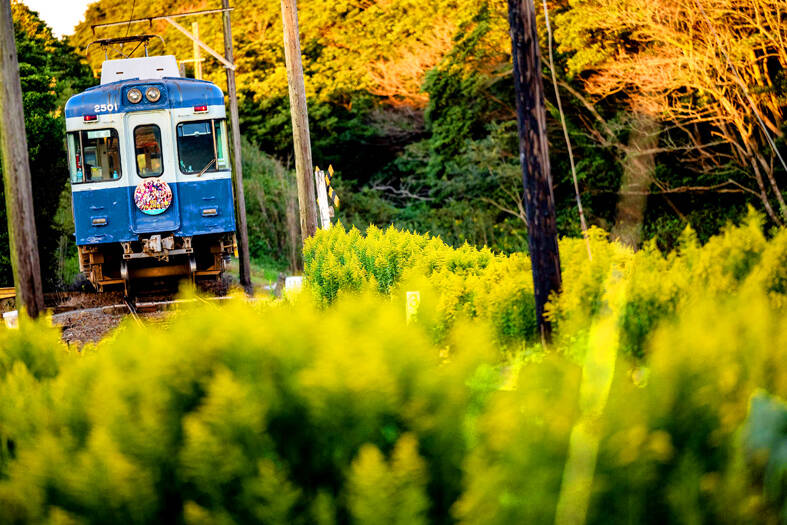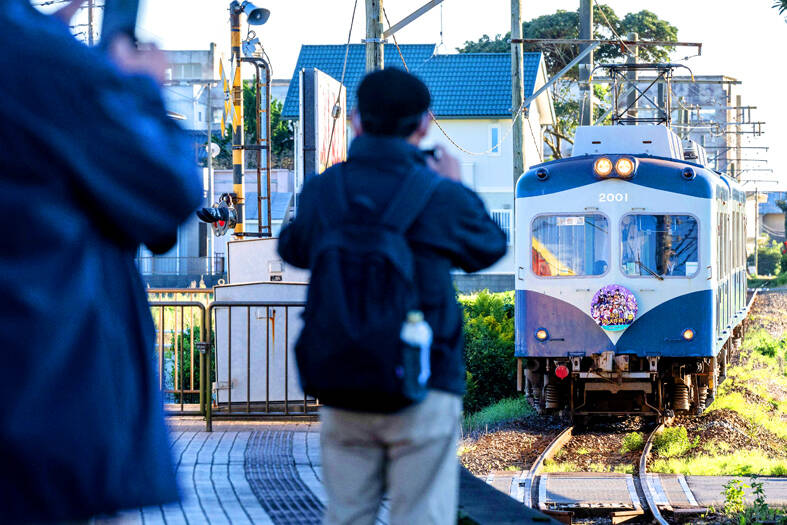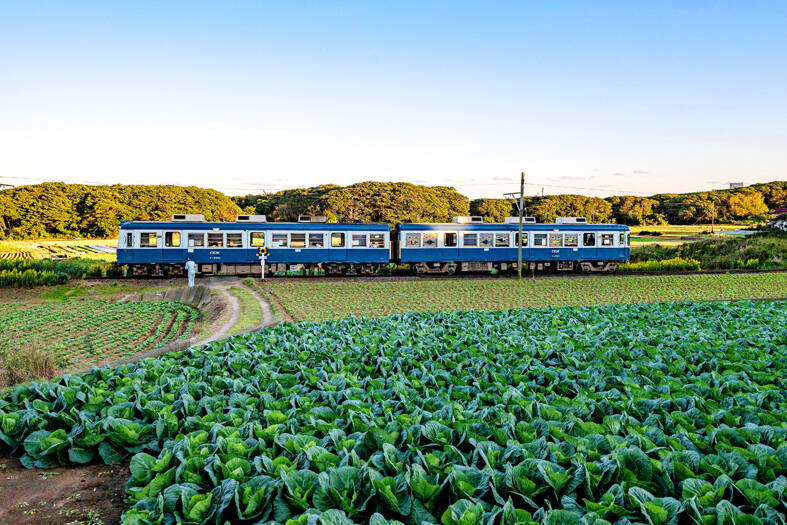In the driver’s seat of a two-car train, Katsunori Takemoto puts on his white gloves and checks the antiquated gauges before setting out alongside cabbage fields in Japan’s rural Chiba.
Like many small railway lines across Japan’s countryside, the 60-year-old trains that ply this route are a loss-maker, but Takemoto has found a way to keep the business afloat.
With a combination of savvy marketing partnerships with pop stars and branded souvenirs, the president of Choshi Electric Railway navigated the firm into the black last year, while helping promote the local region.

Photo: AFP
“I feel strongly that this is the mission of all local trains. We want to serve as advertising vehicles for communities,” Takemoto told reporters. “Towns without trains wither away. So rebuilding rural trains must be done as part of rebuilding communities.”
However, the 99-year-old business he took over in 2011 is the exception rather than the rule in Japan, home to hundreds of loss-making rural rail lines. Depopulation, vehicle ownership, freight trucking and the COVID-19 pandemic have badly affected revenue.
“If we leave things as they are and don’t do anything, it is clear to everyone that sustainable public transport systems will fall apart,” Japanese Minister of Land, Infrastructure, Transport and Tourism Tetsuo Saito said earlier this year.

Photo: AFP
The rural lines are legacies of Japan’s economic boom through the 1970s, but failed to adapt to rural depopulation, as younger people left for cities and some villages emptied altogether.
Infrastructure such as city halls and hospitals are increasingly built along main roads, with visitors expected to drive rather than take trains.
Of the country’s 95 small railways — services outside urban areas or major regional links — 91 recorded deficits last year, ministry data showed.

Photo: AFP
That contrasts sharply with lucrative urban lines such as Central Japan Railway, which operates the Shinkansen super express between Tokyo and Osaka.
It earned a net profit of nearly ¥400 billion (US$2.99 billion at the current exchange rate) for the year to March 2020, before the pandemic took hold.
Major train operators can use profits from urban areas to subsidize rural services, but even industry titan East Japan Railway (JR East), which serves 13 million passengers daily in Tokyo and eastern Japan, is baulking at the cost.

Photo: AFP
It lost ¥68 billion last year on the 66 most problematic segments of rural railways.
In the worst section, the company paid more than ¥20,000 for every ¥100 earned.
“We have done all we can to increase usage and cut costs,” Takashi Takaoka, a JR East executive officer, told reporters this year. “The fact is that there are areas where trains are not the best mode of transportation.”

Photo: AFP
Not everyone agrees, and governors from about half of Japan’s regions have filed a joint plea to Saito warning that slashing rural routes would endanger tourism and require spending on alternatives such as buses.
However, experts say that change is inevitable and communities need to embrace innovations, potentially including self-driving transport.
For now, though, lines like Takemoto’s are turning to alternatives to stay afloat.
His Choshi Electric Railway makes 80 percent of its revenue from non-train operations, including baking and selling its popular soy sauce-soaked crackers.
The company has sold everything from corn puffs to slices of railway track, and Takemoto aggressively promotes the line on television, joking about his cash-strapped firm with well-rehearsed self-deprecating puns.
He has even run “haunted house” trains and “professional wrestling” lines, on which bare-chested fighters rumbled in front of passengers and at stations.
The firm has paired up with pop idols, comedians and YouTubers to keep the company in the public eye.
“Ironically, we have to focus on non-train services to keep the trains running,” Takemoto said.
Despite Takemoto’s efforts, Choshi Electric Railway still depends on subsidies and loans, and passenger figures continue to slide.
“Maybe the time will come when our service as a railway firm will no longer be needed, but it’s not the time now,” he said. “We are beaten up, all battered and covered in rust, but we believe there are many things we can still do and we must keep moving forward.”

CHAGOS ISLANDS: Recently elected Mauritian Prime Minister Navin Ramgoolam told lawmakers that the contents of negotiations are ‘unknown’ to the government Mauritius’ new prime minister ordered an independent review of a deal with the UK involving a strategically important US-UK military base in the Indian Ocean, placing the agreement under fresh scrutiny. Under a pact signed last month, the UK ceded sovereignty of the Chagos archipelago to Mauritius, while retaining control of Diego Garcia — the island where the base is situated. The deal was signed by then-Mauritian prime minister Pravind Jugnauth and British Prime Minister Keir Starmer on Oct. 3 — a month before elections in Mauritius in which Navin Ramgoolam became premier. “I have asked for an independent review of the

France on Friday showed off to the world the gleaming restored interior of Notre-Dame cathedral, a week before the 850-year-old medieval edifice reopens following painstaking restoration after the devastating 2019 fire. French President Emmanuel Macron conducted an inspection of the restoration, broadcast live on television, saying workers had done the “impossible” by healing a “national wound” after the fire on April 19, 2019. While every effort has been made to remain faithful to the original look of the cathedral, an international team of designers and architects have created a luminous space that has an immediate impact on the visitor. The floor shimmers and

THIRD IN A ROW? An expert said if the report of a probe into the defense official is true, people would naturally ask if it would erode morale in the military Chinese Minister of National Defense Dong Jun (董軍) has been placed under investigation for corruption, a report said yesterday, the latest official implicated in a crackdown on graft in the country’s military. Citing current and former US officials familiar with the situation, British newspaper the Financial Times said that the investigation into Dong was part of a broader probe into military corruption. Neither the Chinese Ministry of Foreign Affairs nor the Chinese embassy in Washington replied to a request for confirmation yesterday. If confirmed, Dong would be the third Chinese defense minister in a row to fall under investigation for corruption. A former navy

‘VIOLATIONS OF DISCIPLINE’: Miao Hua has come up through the political department in the military and he was already fairly senior before Xi Jinping came to power in 2012 A member of China’s powerful Central Military Commission has been suspended and put under investigation, the Chinese Ministry of National Defense said on Thursday. Miao Hua (苗華) was director of the political work department on the commission, which oversees the People’s Liberation Army (PLA), the world’s largest standing military. He was one of five members of the commission in addition to its leader, Chinese President Xi Jinping (習近平). Ministry spokesman Colonel Wu Qian (吳謙) said Miao is under investigation for “serious violations of discipline,” which usually alludes to corruption. It is the third recent major shakeup for China’s defense establishment. China in June